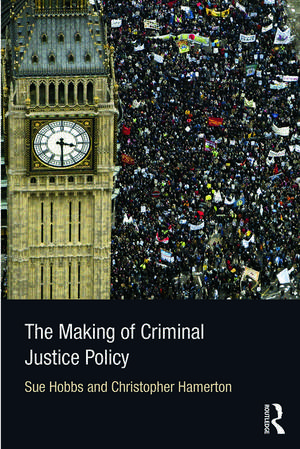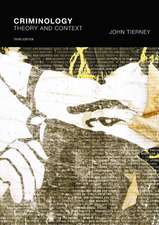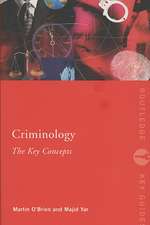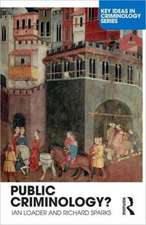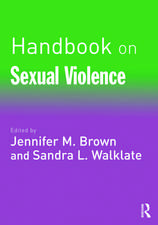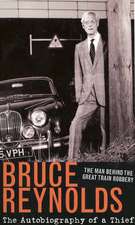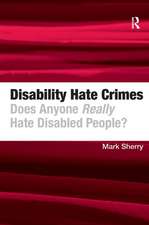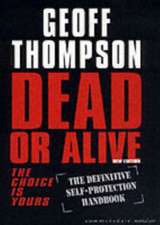The Making of Criminal Justice Policy
Autor Sue Hobbs, Christopher Hamertonen Limba Engleză Paperback – 15 apr 2014
Throughout the book the focus is on key debates and competing perspectives on how policy decisions are made. Recognising that contemporary criminal justice policymakers operate in a highly politicised, public arena under the gaze of an ever-increasing variety of groups, organisations and individuals who have a stake in a particular policy issue, the book explores how and why these people seek to influence policymaking. It also recognises that criminal policy differs from other areas of public policy, as policy decisions affect the liberty and freedoms of citizens. Throughout, key ideas and debates are linked to wider sociology, criminology and social policy theory.
Key features include:
- a foreword by Tim Newburn, leading criminologist and author of Criminology (2nd Edition, 2013),
- a critical and informed analysis of the concepts, ideas and institutional practices that shape criminal justice policy making,
- an exploration of the relationship between criminal justice and wider social policy,
- a critical analysis of the debate about how and why behaviour becomes defined as requiring a criminal justice solution,
- a range of case studies, tasks, seminar questions and suggested further readings to keep the student engaged.
| Toate formatele și edițiile | Preț | Express |
|---|---|---|
| Paperback (1) | 409.13 lei 6-8 săpt. | |
| Taylor & Francis – 15 apr 2014 | 409.13 lei 6-8 săpt. | |
| Hardback (1) | 1109.36 lei 6-8 săpt. | |
| Taylor & Francis – 10 apr 2014 | 1109.36 lei 6-8 săpt. |
Preț: 409.13 lei
Nou
Puncte Express: 614
Preț estimativ în valută:
78.28€ • 81.96$ • 64.78£
78.28€ • 81.96$ • 64.78£
Carte tipărită la comandă
Livrare economică 05-19 aprilie
Preluare comenzi: 021 569.72.76
Specificații
ISBN-13: 9780415676960
ISBN-10: 0415676967
Pagini: 198
Ilustrații: black & white illustrations
Dimensiuni: 156 x 234 x 11 mm
Greutate: 0.29 kg
Ediția:New.
Editura: Taylor & Francis
Colecția Routledge
Locul publicării:Oxford, United Kingdom
ISBN-10: 0415676967
Pagini: 198
Ilustrații: black & white illustrations
Dimensiuni: 156 x 234 x 11 mm
Greutate: 0.29 kg
Ediția:New.
Editura: Taylor & Francis
Colecția Routledge
Locul publicării:Oxford, United Kingdom
Public țintă
Postgraduate and UndergraduateCuprins
1. Introduction 2. Social change and criminal justice policymaking 3. Criminal justice and social policy 4. The criminal justice policymaking process - the formal and informal process 5. The expert and research-led criminal justice policymaking 6. The rise of the public voice, the victims' movement and the mass media 7. International influences on criminal justice policymaking.
Recenzii
‘How does criminal justice policy get made? More importantly, who has the greatest influence? ... and how? … and why? This book critically explores the making and breaking of criminal justice policy, showing just how political criminal justice policy making can be. In a number of striking case studies the book explores who pulls the strings, who holds the purse, who shouts the loudest and whether this is what really makes the difference. The book is a particularly useful addition to criminal justice studies and criminology, drawing upon the insights of policy studies to explain how laws get made, while comprising plenty of useful activities to develop in the classroom.’ - Peter Squires, Professor of Criminology & Public Policy, University of Brighton, UK
'A fresh, original and highly stimulating approach to the study of criminal justice policy.' - Professor Emeritus David Downes, Mannheim Centre, LSE, UK
‘Many practising and academic criminal lawyers complain frequently about the never-ending stream of criminal justice legislation, as they would complain about the weather. The Making of Criminal Justice Policy goes far beyond a critique of the final form and content of legislation. It explains in social, economic and political terms how the policies emerge which ultimately cash out in terms of the legislation that we have. Lawyers, as well as criminologists, should read this book and be educated by it in the fullest sense of that term.’ - Bob Sullivan, Professor of Criminal Law, University of Sussex; emeritus Professor of Law, University College, London, UK
‘Most scholars and researchers accept that the definition and punishment of certain acts as crime is an intrinsically social and political process. Yet there is a dearth of useful accounts or books on how this process unfolds through policy and its effects across the full range of criminal justice institutions. Furthermore, too many students are taught about crime through a fragmented study of offences, theories and methods and then remain bewildered about the criminological big picture.
In filling these gaps, this is a stand-out read among current criminal justice textbooks on the international market. It does not overly simplify its subject matter but with detailed real world examples it gives a lucid account of the complexities of policymaking in contemporary criminal justice.' - Professor Stephen Tomsen, Sociology and Criminology, University of Western Sydney, Australia
'A fresh, original and highly stimulating approach to the study of criminal justice policy.' - Professor Emeritus David Downes, Mannheim Centre, LSE, UK
‘Many practising and academic criminal lawyers complain frequently about the never-ending stream of criminal justice legislation, as they would complain about the weather. The Making of Criminal Justice Policy goes far beyond a critique of the final form and content of legislation. It explains in social, economic and political terms how the policies emerge which ultimately cash out in terms of the legislation that we have. Lawyers, as well as criminologists, should read this book and be educated by it in the fullest sense of that term.’ - Bob Sullivan, Professor of Criminal Law, University of Sussex; emeritus Professor of Law, University College, London, UK
‘Most scholars and researchers accept that the definition and punishment of certain acts as crime is an intrinsically social and political process. Yet there is a dearth of useful accounts or books on how this process unfolds through policy and its effects across the full range of criminal justice institutions. Furthermore, too many students are taught about crime through a fragmented study of offences, theories and methods and then remain bewildered about the criminological big picture.
In filling these gaps, this is a stand-out read among current criminal justice textbooks on the international market. It does not overly simplify its subject matter but with detailed real world examples it gives a lucid account of the complexities of policymaking in contemporary criminal justice.' - Professor Stephen Tomsen, Sociology and Criminology, University of Western Sydney, Australia
Notă biografică
Sue Hobbs, the lead author, is currently part of a Home Office funded research team carrying out an independent investigation into criminal justice policy and practice since the 1980s.
She holds degrees in English Literature and Economic and Social History and Sociology and Social Policy from Manchester Polytechnic and Durham University. She has wide practice experience in the area of criminal justice, and is a former Senior Probation Officer. She worked for 8 years as a Senior Lecturer in Community Justice teaching on probation qualifying degree programme before joining Kingston University as a Senior Lecturer in Criminology in 2006. She retired from teaching in 2012. She retains an active interest in Probation practice and policy development. She recently undertook research for the National Offender Management Service into the transition of young adult offenders from the youth to the adult offending services, and has acted as an academic advisor to Her Majesty’s Inspectorate of Probation.
Christopher Hamerton is currently Senior Lecturer specialising in Socio-Legal Studies and Criminology at Kingston University, where he leads the MA Cybercrime degree. He is also Director of Legal Studies in the Departmental Research Centre, where his role encompasses direction and leadership in socio-legal research. Christopher holds degrees in Law (LLB (Hons), BCL) and Criminal Justice (MA) as a graduate of the Universities of Oxford and Southampton. In addition, he is a Barrister of the Honourable Society of the Middle Temple, and was elected a Fellow of the Royal Anthropological Institute (FRAI) in 2008. He is co-author with Julia Davidson of International Perspectives on Child Victimisation, also published by Routledge. His criminal justice policy research interests include theoretical perspectives on the criminal justice process, legal pluralism, and international responses to globalised crime.
She holds degrees in English Literature and Economic and Social History and Sociology and Social Policy from Manchester Polytechnic and Durham University. She has wide practice experience in the area of criminal justice, and is a former Senior Probation Officer. She worked for 8 years as a Senior Lecturer in Community Justice teaching on probation qualifying degree programme before joining Kingston University as a Senior Lecturer in Criminology in 2006. She retired from teaching in 2012. She retains an active interest in Probation practice and policy development. She recently undertook research for the National Offender Management Service into the transition of young adult offenders from the youth to the adult offending services, and has acted as an academic advisor to Her Majesty’s Inspectorate of Probation.
Christopher Hamerton is currently Senior Lecturer specialising in Socio-Legal Studies and Criminology at Kingston University, where he leads the MA Cybercrime degree. He is also Director of Legal Studies in the Departmental Research Centre, where his role encompasses direction and leadership in socio-legal research. Christopher holds degrees in Law (LLB (Hons), BCL) and Criminal Justice (MA) as a graduate of the Universities of Oxford and Southampton. In addition, he is a Barrister of the Honourable Society of the Middle Temple, and was elected a Fellow of the Royal Anthropological Institute (FRAI) in 2008. He is co-author with Julia Davidson of International Perspectives on Child Victimisation, also published by Routledge. His criminal justice policy research interests include theoretical perspectives on the criminal justice process, legal pluralism, and international responses to globalised crime.
Descriere
This new textbook will provide students of criminology with a better understanding of criminal justice policy and, in doing so, offers a framework for analysing the social, economic and political processes that shape its creation. The book adopts a policy-oriented approach to criminal justice, connecting the study of criminology to the wider study of British government, public administration and politics.
This text is perfect for students taking modules in criminology; criminal justice; and social and public policy, as well as those taking courses on criminal and administrative law.
This text is perfect for students taking modules in criminology; criminal justice; and social and public policy, as well as those taking courses on criminal and administrative law.
